By Chelsea Sanchez
As a child, I intuitively understood that the “negative” behaviors of others were often a response to feelings of fear and pain. I cannot recall anyone explicitly sharing this information with me, yet this basic understanding of human behavior informed how I decided to treat others — with kindness, compassion, and hope.
Furthermore, this basic understanding of human behavior became the lens through which I viewed the world. I was so in tune with how pain impacts people that I grew up to become a social worker. Because, what else was there to do but to learn how to guide people through pain to find hope and healing?
If I could use one word to describe my life over the last eight years that word would be “advocacy.”
— I have helped children and youth overcome barriers to their education, such as packing backpacks with snacks and canned goods to ensure these students have food to eat during weekend breaks from school.
— I have helped individuals displaced by war overcome barriers to their wellbeing, such as ensuring they have access to food, clothing, shelter, and other basic necessities.
— I have helped survivors of human trafficking overcome barriers to their mental health, such as providing transportation to and from therapy and counseling sessions.
And now, my advocacy efforts aim to support children who have experienced abuse and neglect.
To those of us working in child welfare, 47,913 is more than just a number. It represents the children in foster care throughout Texas.
Children deserving of a life without experiences of abuse and neglect.
Children deserving of a safe, nurturing, and permanent home.
Children deserving of a support system advocating for their best interests.
CASA of McLennan County aims to be part of that support system. Our mission is to provide a trained volunteer — a Court Appointed Special Advocate — for every child who has experienced abuse and neglect in the county, so that these children may ultimately thrive in safe, nurturing, and permanent homes.
A Court Appointed Special Advocate is an individual acting in the best interest of children who have experienced abuse and neglect.
Our best-interest advocacy efforts are guided by five principles:
- LEARN all we can about the children and their families.
- ENGAGE with children during regular visits.
- RECOMMEND what is in the best interests of the children we serve.
- COLLABORATE with others to ensure that necessary services are provided and are in the best interests of the children.
- REPORT what we have learned and observed to the court.
Effective advocacy also includes an understanding of human behavior and trauma and its effects.
Children who have experienced abuse and neglect are survivors of complex trauma, which refers to exposure to and long-term effects of multiple traumatic experiences.
Another word often used to describe trauma is “wound.” Survivors of complex trauma have complex wounds that cannot be healed with a band-aid. These wounds shape the way children view themselves, others, and the world. These wounds also shape the way children think and behave.
Some of the long-term effects of trauma include an inability or difficulty to develop healthy, supportive relationships; impairment of the brain and nervous system; difficulty identifying, expressing, and managing emotions; dissociation; being more likely to engage in high-risk behaviors; and difficulty with reasoning, problem-solving, or paying attention.
When children demonstrate the effects of trauma, their behavior is often categorized as “bad” or “negative.” However, these are normal reactions to abnormal experiences. Children often do not know how to talk about their traumatic experiences. (Honestly, most adults have difficulty with this, as well.) As a result, children communicate through their behavior.
Our role as CASA advocates, therefore, is to demonstrate compassionate understanding of the experiences and emotions behind the behavior. Our role is to see the person behind the behavior. Only then can our advocacy efforts truly be in the best interests of the children whom we serve.
Those 47,913 children in foster care throughout Texas deserve kindness, compassion, and hope.
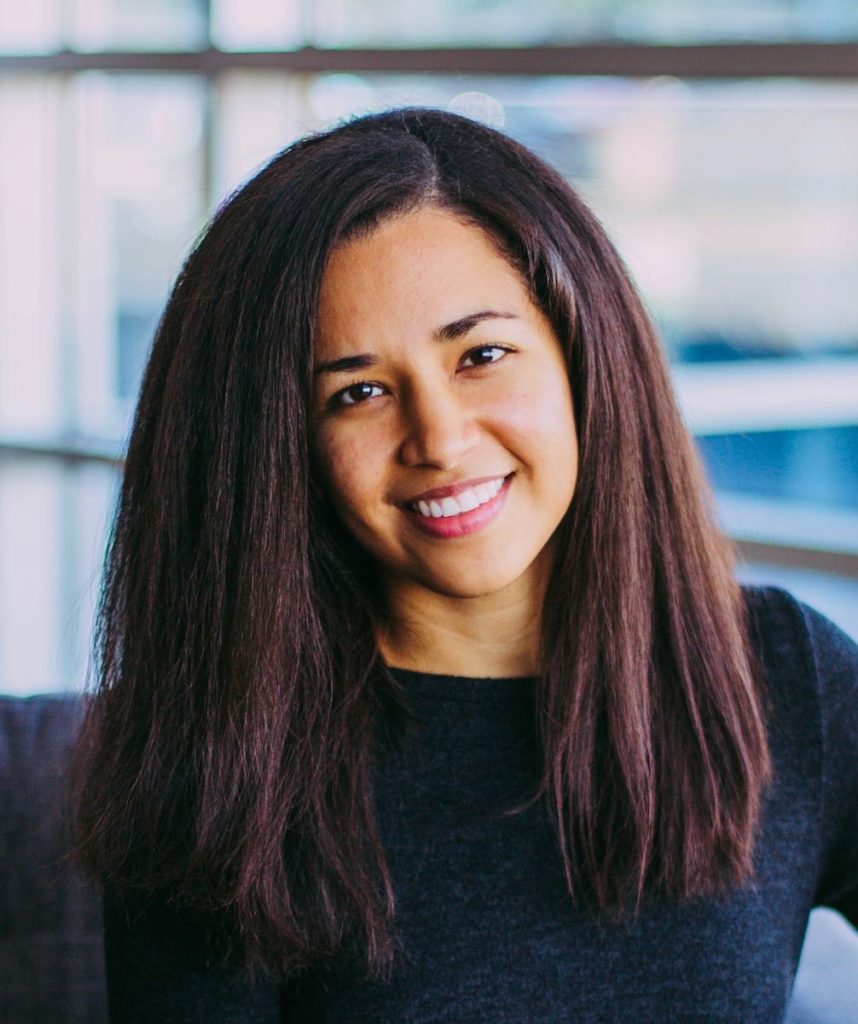
Chelsea Sanchez, program director for CASA of McLennan County, is a first-generation high school and college graduate. She is a Baylor University graduate and Licensed Master Social Worker with over seven years of experience working with at-risk children, youth, refugees, and survivors of human trafficking. She has a diverse set of skills and experience including crisis intervention, case management, trauma-informed care, and training/management of volunteers, employees, and interns. She has provided various presentations and training sessions for conferences and coalitions.
The Act Locally Waco blog publishes posts with a connection to these aspirations for Waco. If you are interested in writing for the Act Locally Waco Blog, please email Ferrell Foster at [email protected].
By Lucas Land
Caring for kids in foster care is a part of Lizzie Allen’s family heritage. Lizzie’s grandmother, Marguerite “Peggy” Terbrack, always wanted 12 kids but only had nine. So, she and her husband decided to become foster parents in 1973. She continued fostering for two decades after her husband died in 1987, and only stopped fostering when a relative gave birth to triplets and she wanted to help them. Peggy passed away in 2009 at age 79, but her legacy lives on in her descendants.
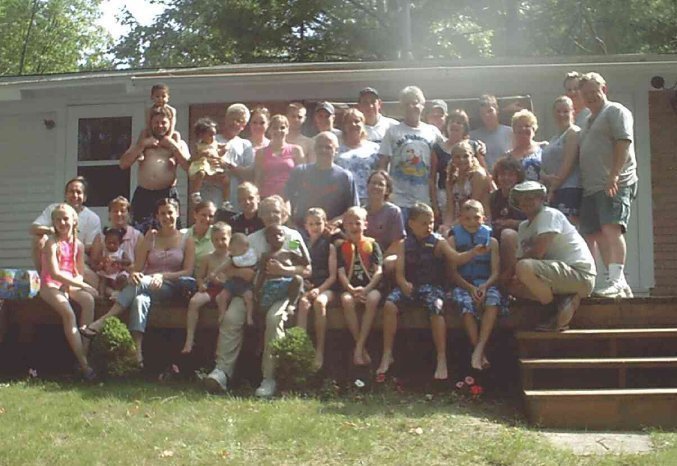
Lizzie shared a typical story about her grandmother. Peggy was driving her tan station wagon on the freeway with twin toddlers she was fostering when the car caught on fire. She pulled over and tried to figure out what to do. She got the first child out of the car, but didn’t know where to put it while she went back for the other one. So she, ever so gently, tossed the child into the ditch on the side of the road and went back for the other child. No one was hurt in the end and she walked away with everyone intact and quite the story to tell. Neither the daunting task of fostering nor flaming cars could keep her from caring for kids in the foster care system.
Lizzie Allen’s mom is one of Peggy’s biological children, six of whom also became foster parents and three of whom also adopted. Lizzie grew up just five minutes away from her grandmother and remembers lots of “cousins” always around. “Cousins” was how they referred to all the foster kids who continued to be family even after they left their care. Even though Lizzie is biologically an only child, she has 17 foster siblings, one of which, her sister Molly, was adopted.
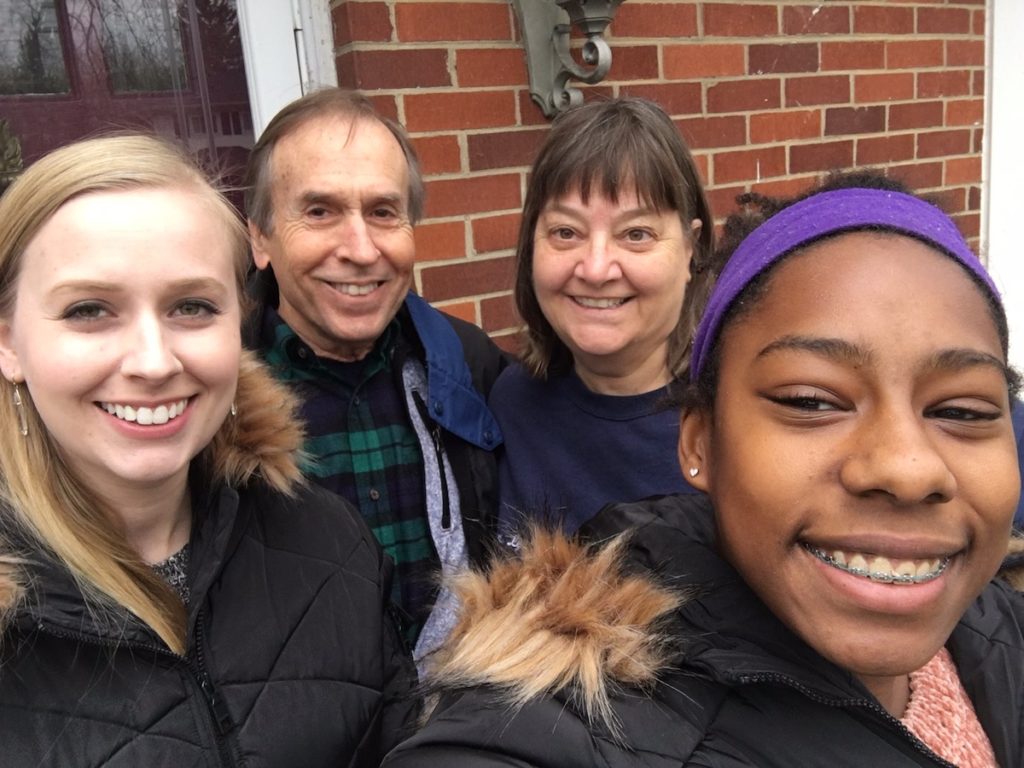
Law school at Baylor wasn’t the original plan for Lizzie. Her adopted sister was non-verbal when she came to their family. She didn’t talk or interact with people and needed a lot of speech therapy. Lizzie wanted to help others like her sister. So, she studied speech pathology and worked in the education system.
She soon became frustrated with the ways that the system failed to serve the students she
worked with, seeing claims being denied and schools not having the funds to adequately serve these students. Consequently, she decided to pursue a law degree at Baylor and hopes to work in special education law.
Her family’s legacy of involvement with foster care and her passion to advocate for kids made becoming a CASA volunteer the perfect fit for her. She completed CASA’s training in October 2020 and was assigned her first case in November.
As a CASA she advocates for the best interest of the child(ren) in her case. This includes working with all of the stakeholders in that case. Lizzie wasn’t sure how she would handle working with the family of origin, because she has seen so many hard things that her foster siblings had to deal with. In her case the parents are working really hard and she feels good about her involvement in the process.
Lizzie has an internship planned with Disability Rights Texas in their Special Education Department. She and her husband met at Baylor, got engaged in Independence, and got married in the chapel at Truett Seminary. So, while they don’t know everything the future holds, their roots in Central Texas run deep, just like the roots Lizzie’s grandmother grew in caring for kids in the foster care system that continue to bear fruit over a decade after her passing.
If you or someone you know is interested in becoming a CASA volunteer, you can go to casaforeverychild.org, email [email protected], or call (254) 304-7892 to learn more.
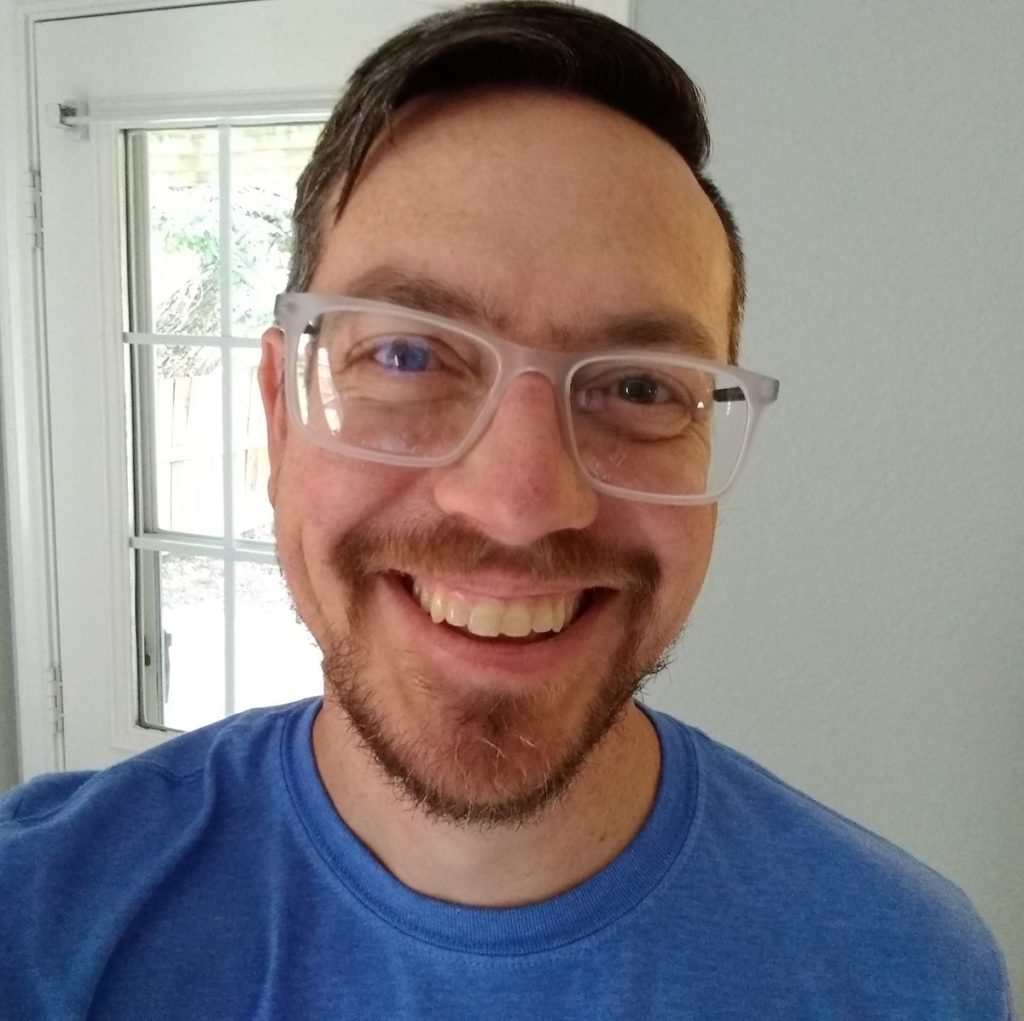
Lucas Land is director of communication and development for CASA of McLennan County. He loves living in Waco and finding ways to connect, get to know, and give back to this community. Lucas lives in the Sanger Heights neighborhood with his spouse, three kids, and their dog, Jayber.
The Act Locally Waco blog publishes posts with a connection to these aspirations for Waco. If you are interested in writing for the Act Locally Waco Blog, please email Ferrell Foster at [email protected].
Editor: In honor of Women’s History Month, we are featuring interviews with local women leaders. These pieces were written by Baylor University students from the Department of Journalism, Public Relations, and New Media.
By Emma Porter
Anna Futral, executive director of CASA McLennan County, came to Waco in 2004 as a Baylor University student. Sixteen years later, she still lives in Waco, now alongside her husband and three children. Initially, business kept Futral in town, however she said it didn’t take long for her and her husband to call Waco home.
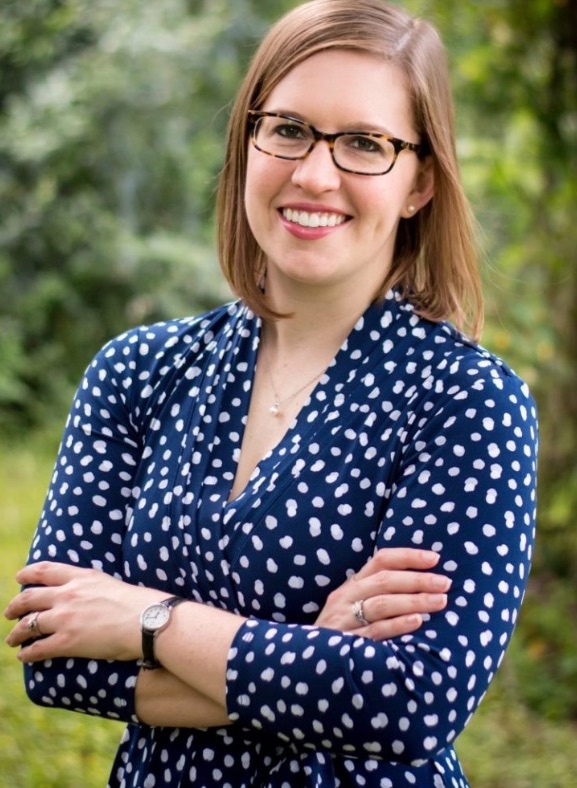
“We liked it a lot, and we really chose to just dive into Waco and build our life here,” Futral said.
As fresh college graduates and newlyweds, Futral and her husband found exploring Waco to be one of their favorite activities. In college, the couple worked with Habitat for Humanity, which Futral said prompted them to see Waco in a broader light than most students.
From hiking in Cameron Park to eating at mom-and-pop shops, and even working with nonprofits, the Futrals did not hesitate to become a part of the community.
“I go across the river to Lula Janes a whole lot more than I should. It’s too good,” Futral said.
Futral mentioned several local spots she loves to eat at, including Lula Janes, Helados La Azteca, Baked Bliss, and a number of taquerias. She said not only is the food amazing, but they also love to support local businesses, especially during the pandemic.
When the Futrals adopted their children in 2015, they knew they wanted their kids to be immersed in their community. The Futral kids love the Mayborn Museum, the Cameron Park Zoo, and hiking with their parents at Cameron Park.
“Waco has a wonderful entertainment and education scene for children,” Futral said.
Like many, the Futral family loves to visit Magnolia Market. The company has brought more business and tourism to Waco, but Futral said one of the best parts is that the Magnolia Foundation has donated to many local organizations, including CASA.
As a female leader in Waco and a Baylor alumna, Futral said she has seen great strides in the city’s economy over her 16 years, however there is still much to be done.
“There are so many folks that genuinely love Waco, and I would encourage them to remember that there are individuals in Waco, members of our own community, that are hurting in some way,” Futral said. “Whether that’s folks experiencing homelessness, children in foster care, or low-income families, we need to consider that there is more to Waco than the business scene or tourist and outdoor parks scene. Those things are all wonderful, but remember that at the heart of our city there are still a lot of folks that need you to tune into their situation and remember that they’re there.”
Futral has worked for CASA for five years. CASA is a nationwide nonprofit that recruits, supports, and trains volunteers who advocate for the safety and best interest of children in foster care.
“We have a really healthy nonprofit scene in Waco. There are groups serving the various populations so there is no lack of ways to get involved,” Futral said.
One way to get involved with the Waco community is through the CASA Christmas store. Each year, Futral said CASA gathers Christmas lists from the 230 children that CASA serves. If someone signs up to be a donor they get matched with a child and given their Christmas list, the donors then have the opportunity to shop and wrap the gifts for their partnered child.

Emma Porter is a freshman journalism major at Baylor University, who fell in love with journalism while writing blog posts about mission work in Guatemala.
The Act Locally Waco blog publishes posts with a connection to these aspirations for Waco. If you are interested in writing for the Act Locally Waco Blog, please email Ferrell Foster at [email protected].
By Lucas Land
Court Appointed Special Advocates (CASAs) all have their own story about how they became advocates. Not all of them start in Russia.
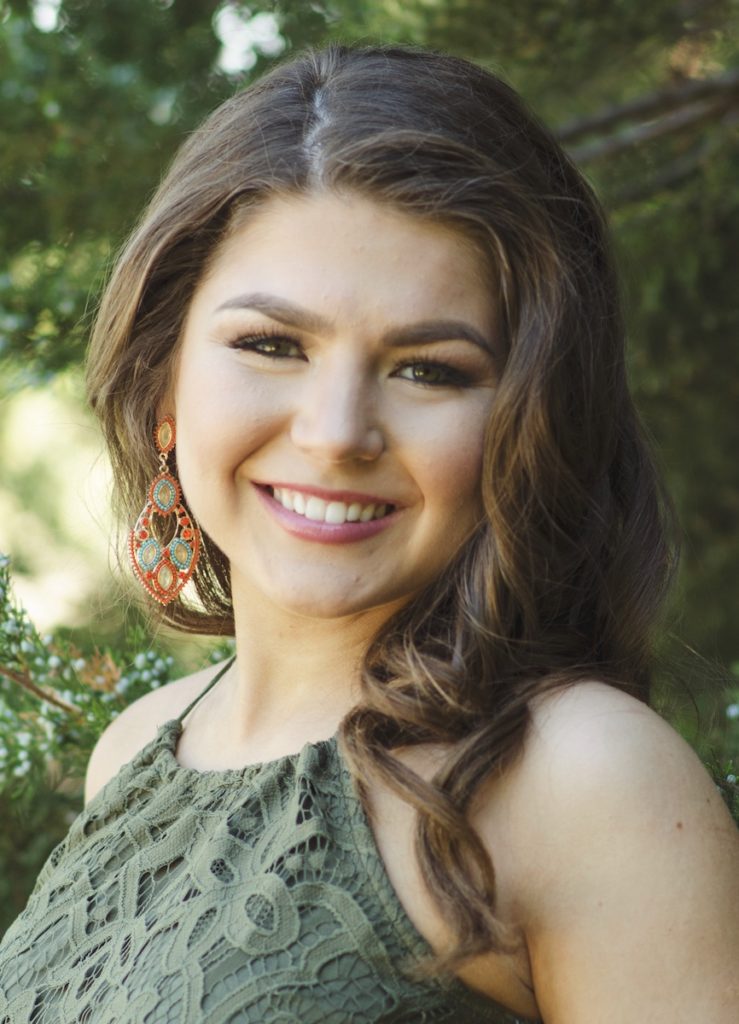
Sasha Messer is a senior psychology major at Baylor University, but when she was 4 years old, she and her brother were adopted from Russia. She grew up in Dallas and says it was often difficult growing up. “I didn’t always understand what people were saying when I was learning English and knew from an early age that I was different,” Sasha says of what she remembers from that transition.
Overall, she had a good experience and was raised in a very stable home with two good role models who provided what she needed. However, because of her experience, Sasha can understand what children in foster care are going through in a way that many of us can’t. So, when she learned about CASA on an episode of Dr. Phil, she knew she wanted to help out.
CASA is part of a nationwide organization of advocates, with 948 chapters in 49 states and more than 97,000 volunteers. CASA volunteers are everyday people – teachers, business people, retirees, stay-at-home parents, and grandparents – who are committed to making a difference for children who might otherwise slip through the cracks in an overburdened foster care system.
CASA advocates are appointed by a judge and assigned to a case where they spend time getting to know the child(ren) involved. Their purpose is to gather as much information about the child(ren), as well as all the stakeholders in their life, such as family of origin, foster placement, doctors, teachers, CPS workers, etc. All of this information is then compiled into a report for the court.
But CASA advocates have to be 21 years or older, so Sasha looked for other ways that she could help. She worked answering calls for the National Suicide Hotline, where she talked to a lot of kids and heard about the difficult things they were going through.
During the pandemic Sasha learned how to make candles, and during the summer of 2020 she started Walking Stick Candle Co. to sell them at a new market in Celina. She still wanted to give back so she decided to donate a portion of her proceeds to CASA of McLennan County.
“I looked into different organizations and knew that a lot needed extra help. Hearing stories about kids left at home in difficult situations without the usual escape of school made me want to help kids in foster care,” Sasha said.
In 2020 Sasha also turned 21 and decided it was finally time to become a CASA advocate. She applied and completed her training in October 2020, attending three evening classes via Zoom and completing many hours of online reading and work. She was sworn in by Judge Nikki Mundkowsky on Nov.3, 2020, to officially become a Court Appointed Special Advocate. She has now been assigned to her first case and is looking forward to working on it.
Sasha is also looking forward to graduating, but hasn’t made definite plans yet for after graduation. No matter what, it is clear that she will continue to find ways to help others and make a difference. If you are interested in making a difference for children in foster care, you can learn more about becoming a CASA by visiting casaforeverychild.org, calling (254) 304-7982, or emailing [email protected].

Lucas Land is director of communication and development for CASA of McLennan County. He loves living in Waco and finding ways to connect, get to know, and give back to this community. Lucas lives in the Sanger Heights neighborhood with his spouse, three kids, and their dog, Jayber.
The Act Locally Waco blog publishes posts with a connection to these aspirations for Waco. If you are interested in writing for the Act Locally Waco Blog, please email Ferrell Foster at [email protected].
By Lucas Land
With the new year beginning, people around the world take on the practice of making resolutions and goals about what they want to accomplish in the upcoming year. Resolutions can range from trying to eat better, exercise more, or spend more time with friends and family. But one resolution that should be directed toward the men in McLennan County is to consider becoming a CASA volunteer and help make a difference in a child’s life.
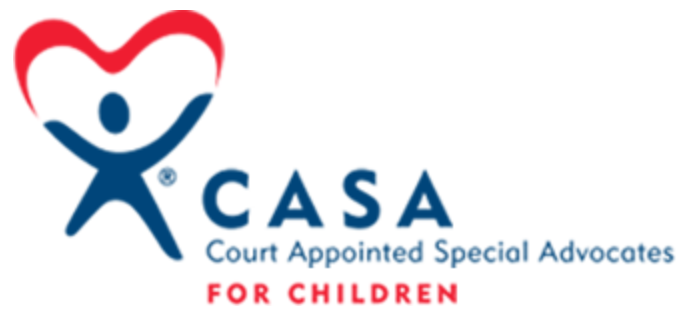
While men and women can both be CASA volunteers, the numbers of male volunteers are particularly low for McLennan County. Only 21% of CASA volunteers in McLennan County are male, while 53% of the kids in need of an advocate are male. And though women make wonderful CASA volunteers, they aren’t able to completely fill the hole of a positive male role model.
CASA volunteers not only advocate for the child throughout the entire court case, but they also meet with the child and provide a consistent positive influence for them during a very stressful time. They are the positive role models that children need when they are in foster care. Women are often seen as being more compassionate and caring toward children in difficult situations, but men are able to be just as compassionate and are equally as essential toward the growth and development of a child.
Growing up, every child wants to have a chance to spend time with a father figure and nurture a relationship that contributes to their development, but this is particularly important for young men. Male children with a positive male role model are more likely to perform better in school and have more career and economic success. Male role models foster more confidence in male children and contribute to stronger communication skills, as men often communicate in different ways than women.
CASA volunteers are required to maintain a year-long commitment to their case, and most volunteers meet with their child at least once a month and research the case for around 15 hours a month. During this new year, men should consider becoming CASA volunteers to help shape and contribute to the lives of children who need them in McLennan County.
If you are interested in supporting the work that CASA does to serve children in this situation, consider becoming a CASA volunteer. You can learn more about it by visiting https://casaforeverychild.org/volunteer/become-a-casa/.
Lucas Land is director of communication and development for CASA of McLennan County. He loves living in Waco and finding ways to connect, get to know, and give back to this community. Lucas lives in the Sanger Heights neighborhood with his spouse, three kids, and their dog, Jayber.
The Act Locally Waco blog publishes posts with a connection to these aspirations for Waco. If you are interested in writing for the Act Locally Waco Blog, please email Ferrell Foster at [email protected].
For many, the holidays are a time of tradition, new memories sprinkled among old memories, and the comfort and certainty of family. As we all know, 2020 and COVID-19 have thrown the holidays for a loop this year! We are scrambling to alter or cancel plans for safety, figure out new ways to carry out old traditions and keep in touch when we can’t be face-to-face. This admittedly feels chaotic, unwelcome, and out of our control.
Even in a year when we aren’t facing a global pandemic, children in foster care experience sudden and drastic life changes that feel chaotic, unwelcome and out of their control. Through no fault of their own, they are removed from their original family due to allegations of abuse or neglect, causing many facets of life as they knew it to suddenly shift. In addition to the initial trauma of the abuse or neglect they may have experienced, they now may be placed with relatives, foster parents, or in a residential facility, possibly in another city, likely enrolled in a different school, away from friends and familiar faces. Their life becomes inundated with new faces…caseworkers, attorneys, therapists, teachers, foster parents, or caregivers. For many children in foster care, the only constant is change.
If you pull this description into holiday time, you can see that it sets children and youth in foster care up for a holiday experience they didn’t bargain for. Caseworkers work hard to set up holiday visits with families of origin, but they often do not fall on the holiday itself and, this year due to COVID, are likely virtual. Some of this likely sounds familiar to a lot of us who have had our own holiday plans upended. There is a string of similarity between those situations and the reality of children in foster care during the holidays. It’s all in the interest of safety. Safety for our health, safety for children.
The hope in both situations is to be able to return to our prior norms in a safe manner. Just as we all look forward to the day when we can return to our routines without threat of COVID, the hope is always for children in foster care to be able to return to their family of origin, if it has been deemed safe. As we experience this unique holiday season, may we remember the young members of our community in foster care and hope for their safety and wellbeing.
If you are interested in supporting the work that CASA does to serve children in this situation, consider becoming a CASA. You can learn more about it by visiting https://casaforeverychild.org/volunteer/become-a-casa/. You can also give the gift of CASA this year by donating at http://casaforeverychild.org/give/.

Though born and raised in Fredericksburg, Anna Futral has called Waco home for sixteen years. She is a graduate of Baylor University, where she received her Bachelor of Business Administration in Accounting and a Master of Taxation. She built her career as a Certified Public Accountant at JRBT, where she worked for over ten years, specializing in service to nonprofit clients, prior to joining CASA of McLennan County in May of 2017. In addition to her business acumen and administrative leadership skills, Anna brings to CASA a deep-seated passion for children in foster care. She and her husband, Trent, are former foster parents and adopted their three children from foster care in 2016. When she’s not busy leading CASA forward or chasing her kids, ages 5, 6, and 7, Anna enjoys reading, spending time with good people, and working with her husband on their 120-year-old house in the heart of Waco.
By Anna Futral
November is National Adoption Month. CASA volunteers stay by a child’s side throughout the case, advocating first for reunification with the child’s parent(s) when safe and possible. If reunification is not safe or possible, CASA volunteers will advocate for the child to be adopted by, or live with, other relatives or family friends. If that is also not possible, CASA volunteers will work towards adoption by a non-relative.
Adoption is a beautiful thing, and just like any other major life decision, it’s not always easy. Some of our CASA staff have been through this journey to adopt. Here is our Executive Director, Anna Futral, and her family’s story.
In the summer of 2012, my husband, Trent, and I had been married four years, had the house, the cars, the jobs, and by all normal accounts, having a baby would be a next logical step in our life at that point. But we’ve never really followed convention, meanwhile, every time the baby conversation came up between us, we both ended up feeling somewhat ambivalent about it, like it wasn’t the answer for us, like there was a different plan in store for our hopes of building a family. Turns out…we were right.
Adoption had always been in the back of our minds. My husband and his sister were each adopted, so that has always been a piece of our puzzle. As baby conversations continued to stall out, we decided to be proactive and research, listen and learn, not knowing that this new path would take hold of us so quickly and so firmly. We heavily researched international adoption, domestic adoption, and that scary thing called foster care, initially setting it on the shelf as something for people more mature than us in our mid-20s, or at least who have some parenting experience. Taking care of a child and then possibly letting them go, abuse, neglect, court dates, birth parent visits, potential behavior and medical problems, social workers, therapists, so many unknowns…
Nevertheless, we sat down for a meeting with a foster care agency, thinking we were just gathering information. Afterwards, we got in my car and I turned it on but we didn’t go anywhere for a few minutes, even though we both needed to get back to work. He said “That felt really, really normal to sit there and talk about all that.” I said, “I know.” There was a strange mixture in our hearts and gut of both peace and fear, both “Yes, this is right” mixed with “You have got to be kidding me.” I stared wide eyed over the steering wheel with tears on my cheeks and Trent stared wide eyed at me. Then we went back to work.
Looking at the world around us, we see so much hurt and pain. We can look overseas at the extreme poverty, starvation and orphanage there. In the summer of 2012, we looked right out our door and realized there are children needing a home right in our own community. Without getting into a debate about which is more important (both are extremely important in our world), we decided that our hearts lie in our local community. So we jumped all in.
The next several years were intense yet exciting, complex yet contained some of the easiest and clearest decisions we’ve ever made. As we opened our home to two and then three children, we were surrounded by caring support and capable professionals. Though the details of our family’s story are our own, a winding path with many curveballs across several years culminated in our open adoption of three biological siblings.
Our family’s story is unique. Our family’s story is challenging. Our family’s story is precious.
We honor our children’s past, celebrate their present and eagerly anticipate their future. We have good times and we laugh so, so often. We work through life’s plain ole challenges as a plain ole family. We face confusion and questions about their tricky start in life when they rise up and we block out the rest of the world, plop down on the rug, hash through it all, say as many words and cry as many tears as we need to until we are as much at peace as we can be in that moment.
Being an adoptive family isn’t always easy. Turmoil pops up and trauma surfaces. Strangers make ignorant comments about our family and people assume things about our story that are entirely false. But we rally as their parents and circle around them. At times we will take the blows on their behalf and shield them entirely, other times we will jump down into the trench with them. Still other times we will sit back and cheer them on from afar as they live out their unique, challenging, precious story with strength, confidence and love.
To learn more about CASA’s work advocating for children in foster care please email [email protected] or call (254) 304-7982 or visit casaforeverychild.org.

Though born and raised in Fredericksburg, Anna Futral has called Waco home for sixteen years. She is a graduate of Baylor University, where she received her Bachelor of Business Administration in Accounting and a Master of Taxation. She built her career as a Certified Public Accountant at JRBT, where she worked for over ten years, specializing in service to nonprofit clients, prior to joining CASA of McLennan County in May of 2017. In addition to her business acumen and administrative leadership skills, Anna brings to CASA a deep-seated passion for children in foster care. She and her husband, Trent, are former foster parents and adopted their three children from foster care in 2016. When she’s not busy leading CASA forward or chasing her kids, ages 5, 6, and 7, Anna enjoys reading, spending time with good people, and working with her husband on their 120-year-old house in the heart of Waco.
By Charles Borsellino
I was recently asked by my CASA supervisor if I was available to take on a new CASA child. It made me think about the road I took to be a CASA volunteer. I left Waco in 1975 to pursue a career in Houston and moved back in 2012 after retiring a second time. I would hear occasional radio spots about CASA, something I guess I overlooked in Houston for the 37 years I lived there. My involvement was a very slow process, but I eventually took time to find out what CASA was all about. After doing so, I realized that this might afford me an opportunity to actually make a positive and lasting impact on a child’s life. I retired from teaching and found some of the students who showed so much promise in my classroom had been pushed into troubling situations as they got older. As a teacher, you have the opportunity and means to prepare and motivate children, but it is only for a short time. Outside of school, many grow up in troubled homes and surroundings that have more impact than I, as a teacher, could ever hope.
I finally signed up to be a CASA volunteer advocate in 2019. I attended classes for three Thursday evenings with eight really great and caring classmates and knowledgeable instructors who were passionate about the children for which the program is intended. We learned about the laws, procedures, and paperwork (there is always paperwork) through in-class instruction and assigned homework. But we also got to meet seasoned volunteers at our sessions. They answered our questions and gave us insight into the emotional highs and lows they encountered.
We graduated as the largest class of volunteers in McLennan County. Everyone who started the first day finished and was sworn in by Judge NikkiMundkowsky on July 30, 2019. We soon met with our assigned supervisors and reviewed the casework for the child (or children, in the event of siblings) we had been assigned. As I read the Department of Family Protective Services (DFPS) report it was hard to imagine even a little of what my CASA child had been through. I remember wondering how a person who had been through so much could ever grow up and lead a normal and productive life. How could any input from me be of any use?
I didn’t have long to think about it. A court date sprang up almost immediately and I had only a short time to meet my child, the DFPS caseworker, Attorney ad litem, Assistant District Attorney, the placement (family keeping the child) and the birth parents. I had to prepare a Court Report while trying to recall everything I had been taught in the classes. I have to admit, it was a pretty daunting experience. I soon learned that my supervisor was always willing to help and I have now come to depend on her whenever I encounter anything I am unsure of. In court I was prepared to give my recommendations but found myself called to testify, something for which I was not prepared for. That was followed by what seemed like continuous activity.
There seemed to be one hearing or conference after another. I observed visitations at the DFPS offices and visited the placement family that had taken my CASA child in. I made appointments with teachers and counselors and probably learned more about my CASA child than I knew about my own. I listened to the facts and advocated for my CASA child’s best interests. I also discovered that some things that at first seemed black and white became gray over time. It’s a humbling experience when you discover your beliefs about someone or something might be wrong. Still, as chaotic as things got to be at times, a visit with my CASA child always made everything worthwhile. That is one amazing kid.
I have gotten to know the stakeholders in the case pretty well during my time with this case, though the players seem to change. Of course, the teachers change from one school year to the next. Those kind of changes are expected and easy to handle. But even attorneys involved have come and gone. Then there are the DFPS caseworkers. We are on our third. I have gained a lot of respect for those caseworkers. Here I was finding it hard to keep up with just my single CASA child while the caseworkers juggled around twenty. Each of their cases involving weekly court appearances and court reports, and children in situations that would make nearly anyone cry. Yet I have been impressed with each as they’ve shown compassion and a high level of caring for their charges during the limited time available. I have spoken with ours on weekends and holidays. I don’t know when they take a break.
After talking to other volunteers I have learned that most cases are not so active and testifying in court is very rare. Regardless, each volunteer has one goal, to advocate for what is best for the child. It has been a great experience and one that I hope benefits my CASA child and, in turn, our community.
All that brings me to why I am writing this. I feel it is important for me to remain a CASA volunteer after my CASA child’s disposition. As the advocate for such a child I might be the only constant in an otherwise confused and sad situation. While I don’t believe I have done anything that anyone else couldn’t have done, I do believe it is important that it was done, and I did it.
For more information about how to become a CASA please contact CASA of McLennan County at [email protected] or call (254) 304-7982.
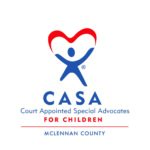
Charles Borsellino was born and raised in Waco, but moved to Houston in 1975 to join the Houston Police Department. Before retirement he went back to college at the University of Houston to get his teaching certificate. He taught elementary school in Houston until he retired from Houston ISD and moved back to Waco.
The Act Locally Waco blog publishes posts with a connection to these aspirations for Waco. If you are interested in writing for the Act Locally Waco Blog, please email [email protected]for more information.
(This post is part of a series of posts about CASA – Court Appointed Special Advocates. – ABT)
By Jennifer Whitlark
Welcome to our 4th and final blog post in our CASA series.
Today, we have some Q&A with advocate Jennifer Whitlark, a working professional who makes time to contribute to her community even amidst her busy schedule.
How did you initially become interested in CASA?
I heard about CASA around town for several years before I got involved. I knew it was a great organization and I waited until I had some more space in my work life in order to join the organization.
What made you decide to get involved?
I work as a school administrator in Waco but I deal mainly with academics in my work and I was really interested in being more involved with the family side of things with the students. Being a CASA allowed me to experience this piece in a new way. Also, given the population I work with in my job, I knew the needs of children in hard situations and this gave me an avenue to work with them and try and make a difference. I also just feel called to love children and care for them.
Can you tell us a bit about your experience with CASA training and how it prepared you for your advocacy?
The training was a great time to learn the law as well as the good and hard points of being a CASA. It was helpful to hear stories of others’ experiences and also hear about all of the supports in place for advocates.
How does your CASA Supervisor support you in your advocacy? Has that coaching relationship been valuable to you?
My CASA supervisor has been a great sounding board for me. He has answered my questions, given my advice, and encouraged me. It has been a very beneficial relationship and his help has been invaluable.
How do you balance CASA and working full time?
I have to work to intentionally balance CASA responsibilities with my job. I have to carve out time to see my CASA child, write reports, and make phone calls. There are seasons when this is harder than others but it has been fine once I found ways to make this happen.
What is a highlight from your CASA advocacy so far when you felt like you made an impact?
At the beginning of my first case, the mom was very standoffish. She didn’t know me and didn’t trust me. She was shy, self-conscious, and defensive. I had to work to slowly break down the wall she had built around herself. Fast forward to 1.5 years later she was truly a different person. At her last court hearing her case was finally dismissed and she got her kids back. The whole courtroom clapped and cheered and she cried. She gave me a big hug and we celebrated. I drove her home from court that day and she told me how much she had grown and how much she had learned. She said she never wished this upon anyone but she explained how much more confident she felt as a mom and how this process has helped her in life. It was such a great conversation and as I reflected on how much she had truly grown from when I met her it was a confirmation that CASAs can make a difference in lives.
To learn more about CASA of McLennan County and the need for more advocates, visit our website at www.casaforeverychild.org or find us on social media @casamclennan.
If you have questions or are ready to begin advocating for children in foster care, email our CASA Recruiter, Kate Gilbert, at [email protected].

Jennifer has called Waco home for 20 years. She is originally from California but came to Waco to attend Baylor and never left. She has worked at Rapoport Academy since 2003, first as a 4th grade teacher for six years, then she stepped into administration as the Dean of Academics over the Elementary Campuses. Her husband, Jason, teaches at Baylor University and they have a 12-year-old daughter, Hannah. In her free time, when she’s not working or advocating for her CASA kids, Jennifer likes to read and work on cross stitching.
The Act Locally Waco blog publishes posts with a connection to these aspirations for Waco. If you are interested in writing for the Act Locally Waco Blog, please email [email protected] for more information.
By Mike Mellina
(This post is part of a series of posts about CASA – Court Appointed Special Advocates. – ABT)
Welcome to the third post in our CASA blog series, which provides a close up look at our advocacy from a CASA volunteer’s perspective.
Today, we have the pleasure of hearing from a tenured CASA volunteer, Mike Mellina, who includes CASA in his various volunteer activities as he seeks to give back to his Waco community.
Mike has been a Court Appointed Special Advocate for six years and is currently appointed to two cases simultaneously, which are the third and fourth cases he has had. Though most advocates are assigned to just one case at a time, Mike is a rock star who has taken on two. Each of his cases have happened to only have one child per case, so he has been an advocate for four children so far.
Before he became an advocate, Mike had no knowledge of CASA, but he saw a billboard or an ad in passing. Then shortly after, he headed to his church, First United Methodist Church Waco, and found a little CASA bookmark clipped to his church name tag with information about becoming a CASA volunteer. He decided to call and learn more, then decided to give it a shot and, as Mike says, “it snowballed from there.”
Mike has been retired for almost nine years and enjoys spending his time giving back to our community. He says volunteering is a good way to fill his time and the fact that he did have time to give helped him take the leap and get involved with CASA.
As mentioned above, Mike didn’t know much about CASA when he jumped in. He went through the training process along with a small group of other advocates, and heard from different CASA staff as well as current advocates during the training, which provided him a good view of the advocacy work involved. The training helped him realize this is not your average volunteer opportunity and that there is a lot involved with advocating for children in foster care. He was able to form a realistic view of what his volunteer role would look like. “All the CASA staff have been super supportive”, Mike said of his time as a volunteer. “I’ve never felt like I’ve been on my own.” He has been involved beyond his casework, such as with continuing education that CASA provides to advocates, and really enjoys helping with public awareness efforts or events that CASA engages in, like a CASA booth at Waco Wonderland or the annual Crawfish for CASA fundraiser event. “I’m willing to pitch in however I’m needed,” Mike said with a smile.
Mike has a bit of advice for anyone considering becoming a CASA. “Be patient and give yourself time, don’t make quick judgments. I like defined goals and no ambiguity and CASA is a lot of ambiguity. If you’re volunteering to pick up trash, you pick it up and put it in the bag. With CASA, there are so many variables. I had no idea how any of this foster care stuff works, and it takes a while to learn all that. Don’t be hard on yourself. The training is good. Rely on the staff support.” He added that even with the learning curve, it is a very doable and rewarding volunteer experience.
When asked what he has enjoyed most about his time as a CASA volunteer, Mike said “Seeing positive results for children. Seeing a kid that you may have had doubts about their chances in life and seeing, to your surprise, the outcome turned out better than you thought it could’ve been for them when you first met them and met their situation. If nobody jumps in, then maybe nothing positive would have happened.”
Mike saw this first hand with one of his CASA cases. When he first met the child involved in the case and learned the circumstances, he thought “this kid doesn’t have a chance”. But in the end, in part because of Mike’s advocacy, he was reunited with family in a safe environment. After the case had closed, Mike reconnected with him and they have kept in contact since, though without any CASA involvement. The child was 14 when the case began and is now about to turn 20, has a great job, is about to get his own apartment. Mike sees him every week and helped him complete his GED. Not only is he doing great personally, but he also chooses to give back to the community and serve in a volunteer role, much like the example Mike has set for him, and he hopes to be able to share his story with other youth in foster care.
To learn more about CASA of McLennan County and the need for more advocates, visit our website at www.casaforeverychild.org or find us on social media @casamclennan.
If you have questions or are ready to begin advocating for children in foster care, email our CASA Recruiter, Kate Gilbert, at [email protected].

Mike Mellina is a retired Wacoan who built his entire career of 38 years at Southwestern Bell, which was purchased by AT&T. He has lived almost his whole life in Texas, except for 2 months as a baby in California. Mike began his career in Houston but transferred his job and moved to Waco in 1983, to be closer to his Dad who operated a ranch in nearby Groesbeck. Mike and his wife, Kate, raised their three kids here, who are now all grown. Mike and Kate have seven grandkids and another one on the way. Aside from his advocacy with CASA, Mike is highly involved in his church, First United Methodist Church Waco. He also gives back to our community as a Reading Buddy in Waco ISD schools and is part of the youth prison ministry out of FUMC.
The Act Locally Waco blog publishes posts with a connection to these aspirations for Waco. If you are interested in writing for the Act Locally Waco Blog, please email [email protected] for more information.
